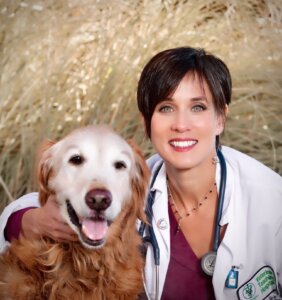3 Things I Wish I Had Known About a Career in Veterinary Surgery on the Day I Graduated
Blog Post | August 4, 2022
By csuvetce
By Nicole Ehrhart VMD, MS, Diplomate ACVS, ACVS Founding Fellow Surgical Oncology
Circa 1990- Pearl Jam was on the radio, Operation Desert Storm was underway, the first episode of Seinfeld aired on TV and big hair was very “in style”. On the day I graduated from vet school, I was arranging to take the 2 day, practical-based New York State Boards in preparation for my internship at the Animal Medical Center in New York City and hoping I would match for a surgery residency 10 months hence. Now, 30 years in the future, if I could tell my freshly-minted-veterinarian-self three things that would be the most important insights to help me throughout the next 30 years of my career, it would be these:
-
-
- Remember to be a student first (always).
-
Becoming a highly skilled clinician or surgeon has very little to do with the information you know already, and has everything to do with your ability to listen, observe and learn. Although the public looks to you as an expert, in reality you are simply a life-long student of practice.
In the beginning of your career, the experienced veterinary technicians will be your best teachers. They perceive your patients through a very different lens than you do. Experienced technicians have far better “spidey senses” than you will likely ever have. Let them know that they are valuable members of your team and seek their input early and often. You will not only earn their respect, but you will begin to understand a component of diagnosis and patient monitoring that veterinary school cannot teach. It will make you a far better doctor, surgeon and team member throughout your career.
Be a student of your patients and their families as well. You can learn a great deal from watching the how the family interacts with the patient in those moments before you begin the examination. Paying attention there will pay dividends when you begin to discuss diagnosis and treatment options in language that aligns with their unique relationship and treatment goals for their pet.
-
-
- What you learn in a textbook rarely translates directly to the patient in front of you. The chapter on liver lobectomy with the black and white drawings of the important vessels is generally not directly applicable to that bleeding liver tumor in a 10 year old Mastiff with bizarre tumor-associated blood supply. Black and white surgical principles and techniques are excellent guidelines, but they only serve as bumper guards against doing something harmful. An excellent surgeon is one who can creatively and skillfully navigate the thousand shades of grey in between, overlay those nuances on the basic principles of surgery and apply the combination to the task at hand.
-
- Reinventing yourself is a natural and healthy process in this career.
-
What you imagined you would be doing for your whole career is rarely where you end up. Perhaps you were certain you would always be in academia and then became a partner in a private surgery practice. Maybe you were sure you would never enjoy soft tissue surgery and now exclusively practice in that domain. Or maybe you moved from clinical work to take on a leadership role in an academic research program, industry or non-profit. The beauty of this career is that the people skills you develop, and the creative reasoning required to be an excellent surgeon can serve you (and the world) in many ways. Don’t be afraid to reinvent yourself and think out of the box about what aligns best with your passion, talent, and life stage. This career will open many doors for you. Be bold enough to choose your own adventure.
As I conclude this blog, wistfully looking back on my younger self from the vantage point of 30 years down the road, in my mind’s eye I watch her walking up on stage to be hooded and accept her diploma. It occurs to me how deeply humbled and grateful I am for the people who shaped her dreams, supported her and shared her journey. And if it’s ok, I also have one last piece of sage advice to impart: Hey doc, you’ll need to lose the big hair.
Click here to receive notifications when new blog posts are published
Dr. Ehrhart is the Director of the Columbine Health System Center for Healthy Aging at CSU and a Full Professor in the Department of Clinical Sicences. She holds the Ross M Wilkins MD Limb Preservation Foundation University Chair in Musculoskeletal Biology and Oncology at CSU and is the Director of the Laboratory of Comparative Musculoskeletal Oncology and Traumatology. Dr Ehrhart is board certified in veterinary surgery and a Founding Fellow in Surgical Oncology. She has been actively involved in tissue regeneration research, mesenchymal stem cell biology, and sarcoma research for the last twenty years. She has been an keynote speaker at various venues for translational research, both nationally and internationally. She holds joint faculty positions in the School of Biomedical Engineering, the Cell and Molecular Biology program, the Gates Regenerative Medicine Center at the University of Colorado and The University of Colorado Cancer Center. Most recently she has been directing a research program focused on strategies to slow cellular aging and age-related disease in both humans and companion dogs.



